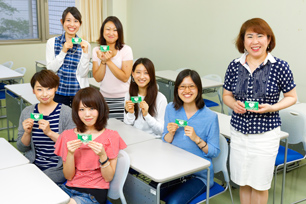Etsuko Soeda , Assistant Professor, Faculty of Nursing and Medical Care
Life, Bonds, and Organ Transplantation
I have been dedicating myself to the studies of advanced medical care—organ transplantation and pediatric nursing—in order to broaden my perspective and my skill set as a nurse

What sets transplantation medicine apart from other types of medicine is that transplant patients must receive organs from donors. This means that transplantation is an emotional medicine since it entails one person’s relationship with another. That is, a sick patient, when determining whether or not to receive a transplant, must think not only about their own “life and death”, but also about the “bond” they will have with the donor. The patient is keenly aware that death may come at any time, and this is something they suffer alone.
An essential consideration are the organ donors and their families. Families of brain-dead donors must deal with the sudden death of a loved one, and as they do so they decide, through sheer goodwill, to donate the organs in the hope that someone else’s life can be saved. In the case of live organ transplantations, donors give their organs in order to save the life of a family member.
In such situations, it is natural that patients and their families subconsciously build emotional barriers in order to protect themselves. Breaking down each barrier—by offering a kind word, by getting angry or scolding them, or by joking with them—is an important role we nurses must perform. I believe that this kind of care supports the notion of soft science, and that some kind of healing process is triggered when each barrier is stripped away. The purpose of this seminar is to study these concepts from Japanese and overseas reference materials, and to visualize the phenomena that are right in front of us.
Kidney, liver and intestinal transplantations are conducted at the Keio University Hospital. Liver transplantation has a twenty-year history at the hospital, which began in 1995, led by Professor Masaki Kitajima, a specialist in general and digestive surgery. Kidney transplantation has an almost thirty-year history. The students learn a great deal from the conferences and study groups that they participate in.
In this world where medicine is making huge strides, I hope the students will become compassionate nurses who are sensitive to the needs of the patients, and who can be the “guardian goose*” that watches over them.
*The "guardian goose" cranes its neck to watch for danger while the rest of the flock focuses intently on pecking their food. This is a term used by Keio founder Yukichi Fukuzawa who urged scholars to make thorough assessments of the present situation and deliberate on what the future holds, standing firm amidst the currents of the times.
Student’s Voices
Yuki Kurihara
Fourth-year student, Faculty of Nursing and Medical Care
Improving nursing skills through organ transplantation
The main research topic of the seminar held by Assistant Professor Soeda is organ transplantation. With organ transplantation, medical workers must continue to care for the patients and their families long after the transplant surgery is completed. This relationship that develops between them goes beyond the medical field, and has a huge impact on the lives of the patients and their families. That is why everyone involved in the transplant, starting with the transplant coordinator, must possess the ability to provide the most meticulous care, and be equipped with the most advanced knowledge and skills.
Assistant Professor Soeda is a good-natured and wonderful person, and she is also an expert transplant coordinator. I will dedicate myself to my studies in the hope that one day I am able to provide the same kind of compassionate and advanced nursing care to as many patients as possible.
*Position titles, etc., are those at the time of publishing.
